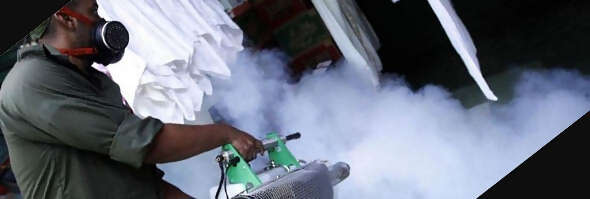BATTLING ZIKA Cuba calls in the army
Posted on 02/25/2016 | About Cuba

Olive-clad soldiers are going door-to-door across Cuba, filling houses with mosquito-killing fog in a nationwide mobilization to keep the Zika virus out of one of the last countries in the hemisphere without it.
President Raul Castro announced this week that he was throwing 9,000 military personnel and hundreds of police into what he called Cuba's “inadequate” fight against the mosquito that carries the virus linked to birth defects and paralysis elsewhere in Latin America.“Our people will know how to demonstrate their ability to organize and maintain the public health achievements of the revolution and prevent our families from suffering,” Castro declared. “We must be more disciplined and demanding than ever before.”Castro's call to action included an unusual admission of deficiencies in Cuba's vaunted free neighbourhood-level health-care system, which has suffered in recent years from lack of equipment, short-staffing and low morale among poorly paid state health workers. It was also a test of the communist government's once-legendary ability to marshal the entire country behind efforts ranging from civil defence to bigger sugar harvests to disease prevention.The government announced Tuesday that it was activating the Committees for the Defence of the Revolution, a neighbourhood watch organization that enforced government dictates for decades but has lost importance in recent years. The government said that committees across the country would distribute anti-Zika information to every Cuban and inspect at-risk sites for mosquitoes in coming days.Gaps have been increasingly obvious in the effort to spray homes and businesses for the Aedes aegypti mosquito, which has infected thousands of Cubans with the dengue virus and dozens with chikungunya, a disease that causes fever and severe joint pain. Cubans frequently claim allergies or asthma to put off fumigation crews composed of public health workers and teenagers completing obligatory military service. Unwilling to force homeowners to let them in, the crews often mark the residence as fumigated and move on to the next house or apartment.Those days appear to be ending as troops deployed across the country with hand-held foggers are now armed with the threat of fines for anyone who resists fumigation.“Cuba has a series of advantages: It's an island, it has a homogenous population and a health infrastructure that generally reaches every street corner,” said Jaime Torres, director of tropical medicine at the Central University of Venezuela. “And its political system allows it to take measures, including imposing punishments, that are harder to impose in other places.”In Cuba's airports and cruise ship terminals, crews of white-clad doctors are monitoring incoming travellers for high temperatures or other signs of illness. Medical officials said the fight against Zika had taken on increasing urgency as Cuba's hot, humid spring and summer draw near.“The objective is to diminish the adult mosquito population ahead of the coming critical months,” said Reinaldo Garcia, head of anti-mosquito efforts for a neighbourhood health clinic in Havana.“Although there is no sign of that disease, we want to eliminate the transmitter, eliminate the chain, so if it enters the country there is no way to transmit it,” Dr. Osvaldo Mendoza of the Public Health Ministry said as he supervised a crew of military fumigators.Medical workers were ready to move into any area where a possible Zika case is detected, quarantining and testing anyone who lives within 500 metres, said public health official Dr. Lorenzo Somarriba.
